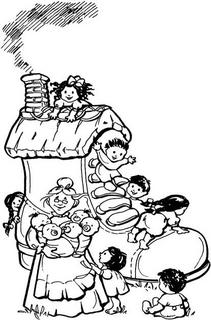The casinos are coming to Singapore. And in the ST today, journalist M Nirmala wrote about how the CID is gearing up to make sure that the casinos stay relatively crime-free.
~~~~~~~~~~
May 27, 2005
CID gears up to keep casinos crime-free. One new unit to regulate casinos, another will tackle loan sharks
By M. Nirmala
EVEN before the first building stone is laid for any casino here, regulators are gearing up for the challenge in a big way.
The Criminal Investigations Department (CID) will set up two new units specially targeted at busting casino-related crimes, Home Affairs Minister Wong Kan Seng told The Straits Times in an interview.
~~~~~~~
I was particularly interested in the part about the loan sharks. Here's more of what Nirmala wrote:
~~~~~~~~
Mr Wong served notice that the police will be tough on all those involved in the loan shark business, from the 'runner' to the boss.
'Now we are going to target every level of the chain, from the runner all the way to the top man,' he said.
'So a person may claim that he is an innocent person because he was forced into becoming a loan shark runner. Well, he will be considered to be involved in illegal moneylending activities because he is now abetting an offence. And if he harasses people and he is arrested, he will be dealt with according to the law.'
The more senior the person is in the syndicate, the more culpable he is, and the heavier will be the penalty, he added. In fact, the government won't hesitate to use the toughest laws at loan sharks.
~~~~~~~~~
So the government will be getting very tough on loan sharks. But wait, there's more:
~~~~~~~
Said Mr Wong: 'If necessary, we will even use the criminal law temporary provision, as we've done for drug syndicates and gangsters.'
This law has helped nail masterminds and syndicate leaders. When victims or accomplices refuse to testify in court, the law allows for their statements, oral or written, to be used against such offenders. It is used in hearings held by advisory committees which make recommendations to the President on all detention orders.
~~~~~~~~~~~
In case you didn't know it, our friend Wong Kan Seng was referring to the
Criminal Law (Temporary Provisions) Act, Chapter 67 of Singapore. This is one of those laws that throw up a rash of human rights issues.
Traditionally, the CLTPA has been used on secret society members. Essentially, if a bunch of government officials (such as the Minister, his advisory committee and the President) think:
(a) that you're associated with "activities of a criminal nature"; and
(b) that it's a good idea to detain you in the "interests of public safety, peace and good order",
then they can make an order to get the police to detain you.

They don't need to prove that you were really associated with criminal activities. They don't need to charge you with any offence. They don't need to go to court and show any evidence of any actual offence.
Yep, this is another version of "
detention without trial" (the other version being the one under the Internal Security Act). And I think that smart loan sharks should stay far, far away from Sentosa.
Which led me to my next interesting thought. In the absence of loan sharks, where will gambling Singaporeans turn to next, for money?
In the past three or four years, banks in Singapore have been aggressively promoting a new type of product. It's called the personal line of credit. Essentially you get to borrow up to two times your monthly salary. No questions asked. (You pay interest, of course). You get some nifty features like a chequebook and access to the funds via ATM.
I've often suspected that the banks are not making much money from these personal lines of credit. I've had the feeling that most of the credit-line customers are like me. I sign up to collect the attractive free gift, but I never actually use the line. Annual fees are waived for the first year. Immediately after a year, I terminate the line, then sign up again to collect another free gift.
Right now, many Singaporeans just don't have a real use for personal lines of credit. See for example what Mr Brown has to say on the
topic.
However, when the casinos arrive and the loan sharks get locked away, it may well be the banks which celebrate most exuberantly. Addicted Singaporeans will surely borrow. They can even borrow to pay the $100 casino entry fee. Remember - no questions asked. That's a basic characteristic of personal credit lines.
And with the serious competition - loan sharks - locked away in jail, it's the banks which will enjoy this exciting spin-off from our wonderful integrated resorts.
~~~~~~~~~~~~~~~~~~~~~~~~~~~~~~~~~~~~~~
Some examples of personal lines of credit available in the Singapore market:DBS CashlineOCBC Prestige CreditMaybank CreditAbleStandard Chartered Personal CreditUOB CashPlus HSBC Personal Line of Credit~~~~~~~~~~~~~~~~~~~~~~~~~~~~~~~~~~~~~~




